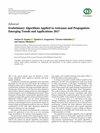利用新型环保添加剂工艺制备柔性RFID天线
IF 1.1
4区 计算机科学
Q4 ENGINEERING, ELECTRICAL & ELECTRONIC
引用次数: 0
摘要
用于RFID应用的柔性天线的制造可分为减法和加法两种方法。在本研究中,提出了一种低成本的添加剂方法,包括打印铝浆和利用电替换反应。采用电替代工艺,利用硫酸铜废液将铝电极转化为高导电性铜电极。研究了铜电极的表面平整度、厚度、铝铜转化率等物理特性。该铜电极采用创新的添加剂技术,在75°C的温度下加热15分钟,其电阻率最低,为5.89 × 10-8 Ωm。这种电阻率与商业银厚膜电极相当,使其适合用于制造RFID模块应用的RFID天线。该RFID模块在1.26 GHz时的S11为- 40 dB,最大增益为2.87 dBi,最大效率为53.63%,读取距离为9米,具有出色的性能。使用铜箔天线的RFID模块的读取距离更长(8.5米)。本文章由计算机程序翻译,如有差异,请以英文原文为准。
Fabrication of a Flexible RFID Antenna by Using the Novel Environmentally Friendly Additive Process
The fabrication of flexible antennas for RFID applications can be divided into subtractive and additive methods. In this study, a low-cost additive method is proposed, which involves printing aluminum paste and utilizing a galvanic replacement reaction. Through a galvanic replacement process, copper sulfate waste effluent was employed to convert the aluminum electrode into a highly conductive copper electrode. The physical characteristics of the Cu electrode, such as surface flatness, thickness, and Al-Cu conversion ratio, were studied. The Cu electrode, produced using an innovative additive technique at a temperature of 75°C for 15 minutes, exhibits the lowest resistivity of 5.89 × 10–8 Ωm. This resistivity is comparable to that of a commercial silver thick film electrode, making it suitable for use in manufacturing RFID antennas for RFID module applications. With an S11 of −40 dB at 1.26 GHz, a maximum gain of 2.87 dBi, a maximum efficiency of 53.63%, and a reading distance of 9 meters, the RFID module demonstrates impressive performance. The reading distance of an RFID module with a copper foil antenna is longer (8.5 meters).
求助全文
通过发布文献求助,成功后即可免费获取论文全文。
去求助
来源期刊

International Journal of Antennas and Propagation
ENGINEERING, ELECTRICAL & ELECTRONIC-TELECOMMUNICATIONS
CiteScore
3.10
自引率
13.30%
发文量
158
审稿时长
3.8 months
期刊介绍:
International Journal of Antennas and Propagation publishes papers on the design, analysis, and applications of antennas, along with theoretical and practical studies relating the propagation of electromagnetic waves at all relevant frequencies, through space, air, and other media.
As well as original research, the International Journal of Antennas and Propagation also publishes focused review articles that examine the state of the art, identify emerging trends, and suggest future directions for developing fields.
 求助内容:
求助内容: 应助结果提醒方式:
应助结果提醒方式:


